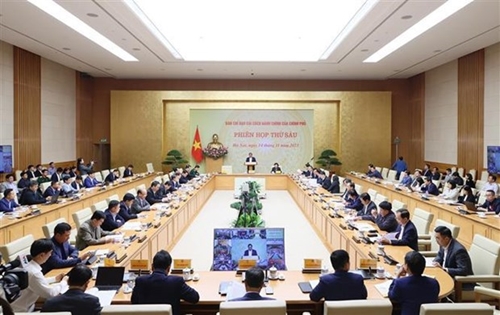The meeting was held in the form of videoconferencing, connecting the committee with the People’s Committees of the 63 provincial-level localities nationwide.
In his remarks, Prime Minister Pham Minh Chinh, who is also head of the steering committee, affirmed that administrative reform has recorded many improvements.
    |
 |
|
The sixth meeting of the Government’s Steering Committee for Administrative Reform on November 14 |
Special attention has been paid to institutional reform and law building, while administrative procedure reform and improvement of the investment and business climate continued to be intensified.
The Prime Minister noted that since 2021, nearly 2,500 business regulations have been abolished or streamlined, and ministries have cut and simplified 437 administrative procedures related to citizens' papers.
He said the reform of the apparatus's organization has also made good progress, with most ministries completing regulations on the functions and tasks of their internal bodies and all 63 provincial-level localities basically completing the rearrangement of their departments, thus significantly streamlining the organizational apparatus.
At the same time, several important institutions and policies on public affairs and public servants have been promulgated.
The Government leader also highlighted the drastic efforts in digital transformation and digital Government building. As a result, the rate of administrative procedure applications submitted online to ministries and agencies increased 1.5 times from 2022 to 80.7% of all dossiers, and the rate among applications submitted to local administrations rose 1.8 times to 6.5%.
All 63 localities have completed the connection and data sharing between the national population database and the administrative procedure portals, issued 84.7 million chip-based ID cards, verified 91.2 million units of information on the social security database.
The Prime Minister also pointed out certain shortcomings in the work, saying that they are mostly attributable to subjective causes.
He stressed that some officials, especially those holding top positions in some agencies and localities, are not fully aware of their responsibility in the work. Some ministries, sectors, and localities have not taken drastic actions. Mechanisms and policies remain contradictory and overlapping. The capacity of civil servant and public employees at certain places has yet to meet requirements, and discipline observance is not strict. Meanwhile, the coordination among agencies and units is not timely and effective enough, he added.
The Prime Minister emphasized the need to enhance officials’ sense of responsibility and activeness, take flexible and active steps in implementing administrative reform tasks, boost power decentralization and resource allocation in tandem with inspection, supervision and power control, and stringently enforce administrative discipline.
He required members of the Steering Committee to uphold their leadership to fulfill administrative reform tasks for 2023, with a focus on the reform of institutions, administrative procedures, the state administrative apparatus, public affairs regime, public finance, and the building and development of an electronic Government and a digital Government.
He requested ministries, sectors, and localities to continue reviewing and reforming their work methodology, bring into play their leaders’ role to fruitfully perform administrative reform duties, and increase dialogue with people and businesses in order to grasp the situation and order the settlement of obstacles.
Source: VNA